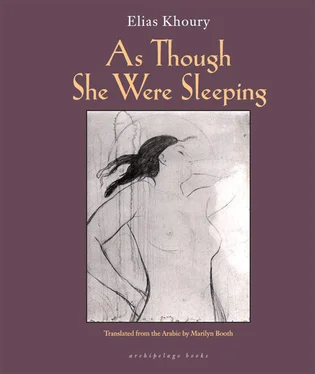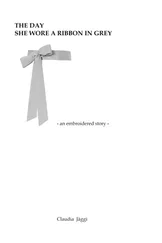On that steaming July morning when the temperature reached 34 °C, Saadeh lay flat and still on the bed, pain clubbing her body. She screamed louder and louder as the yellow hue spread across her face and hands. Always before, at the sight of the waters gushing out as the labor pains began, Yusuf had gone running to Nadra’s home. Opening her door, the midwife welcomed him with the same words every time: she could see another boy on Yusuf’s face. Thick smoke billowed in interlacing circles from the interior and Yusuf could hear Master Camille’s cough and his friends’ boisterous sounds as they filled the home with the popping and hissing of their narghiles and their noisy card games. He would scurry to the back of the house, pick up the birthing chair, and hurry home, Nadra following him with the inevitable cigarette in her mouth.
That day when the door opened there was no smoke. There were no sounds of narghiles or shouting of card players. Master Camille wasn’t there. Nadra was in the kitchen cooking the midday meal. Yusuf bent to pick up the chair but it wasn’t where he had always found it before. He froze, not knowing what he ought to do. Nadra tugged at his arm and ordered him to follow her.
The chair broke, she said. From now on we’re going to have babies the way those Europeans do it.
He didn’t ask her what she meant by this cryptic declaration. He was close behind her as they ascended the long flight of stairs connecting Abu Arbid Street, where Nadra lived, to Zaroub at-Tawil Street, where his wife waited. When Nadra told her to lie down, Saadeh did so, but the midwife scolded her. Sideways across the bed, she ordered. Lift your legs. We have to be able to work.
Saadeh changed position, the pain squeezing her insides. She said only one word — Where’s —? — but could not complete her sentence because she began to convulse with pain.
There’s no chair, said Nadra. Today we’re gonna do it the mudirn way. Lift your legs and push hard. Really hard.
But Saadeh began to cry. Nadra washed her hands with soap and water, came over to Saadeh and told her not to be afraid. Twisting on her mattress, Saadeh did not hear Nadra’s words. She needed air; when she pushed, the air seemed to get stuck in her lungs. She opened her mouth in desperate search of oxygen and felt Nadra’s hand behind her with a small towel, wiping away the sweat that had collected on Saadeh’s neck and brow.
Quiet, Saadeh, relax.
But the child refused to begin the voyage out into the world. Nadra knelt between the thighs of the woman stretched across the bed. She probed for the head, already in the proper position for its descent. Nadra tried to grasp hold of it but could not.
Push, push!
Air, let some air in, I’m choking, said Saadeh, shivering. A powerful tremor seized her and her teeth began to chatter.
I’m dying — air!
Don’t be afraid, nothing’s going to happen to you! shrieked Nadra.
Saadeh closed her eyes, no longer able to listen. The ringing in her ears got louder. She abandoned herself to the shivering that seemed to have taken over her entire body. The midwife scurried outside to fetch cold water, carrying it into the house in a small basin. She began laying cold compresses on Saadeh’s forehead. The trembling lessened and it seemed the pregnant woman had regained her ability to breathe.
I’m going ’neath you, said Nadra, and when you start feeling the labor pains pressing really hard, we’re going to push one time and Go’ willing that will be all it takes.
The midwife crouched down below Saadeh. The sweat began to spread across her short blue dress and she too felt as though she could not breathe. She wanted to swear — this whole f-ing business! — but she got the better of herself and simply called out, Push! Saadeh pushed with all the strength she had. Push, come on, again! But Saadeh’s body suddenly went completely limp.
A moment later the tremors once again seized the pregnant woman lying on the bed. The midwife could find nothing to do about it. She stood waiting and then began to notice a peculiar color that seemed to be hovering all around her. Saadeh was floating in the color green. A greenish hue spread over her cheeks and eyes and it seemed to erase everything Saadeh was. Green stains spread across her face and hands, her thighs and feet. Never in her long practice had Nadra seen the likes of this color. When she had entered the room and ordered Yusuf to take a pair of bedsheets and cover the pair of windows that looked out over the Rahhal family’s garden next door, the yellow color had convinced her that fire was shooting into the room.
What’s this color? Change those sheets!
But Yusuf didn’t move. That’s all we have, he said.
Out there — go on out, she ordered him.
It’s like we’re inside an oven, said Nadra to the nun sometime later, as she said goodbye at the front door.
Take that cigarette from your mouth, said Sister Milana as she left the house, raising her palms skyward as if to give witness to the world that she had been the one to handle this birth.
The yellow hue spread across the place like a fire consuming everything in its path. But then came the green: a bright, open green that slowly grew more intense until it was a dark green tint spreading in rings to encircle the hands and feet of the pregnant woman. Her limbs went slack and her tears mingled with the drops of sweat falling from her brow. She looked nothing more than a moaning heap of flesh. Nadra couldn’t believe her own eyes. She bent over Saadeh’s face, wiped away the sweat and heavy tears with a small white towel, and noticed the smear of yellow left by the sweat.
Nadra was afraid. Her heart dropped into an empty space between her feet. What was there to do now? The nun watched the scene calmly, then she began to issue commands, and suddenly it was over.
Standing before this green pockmarked miasma advancing like rot over everything, Nadra was certain that she could no longer do anything. The one idea remaining in her head was to open the door and escape from this hellfire.
On one occasion, years later, she told Milia that she had been so afraid of Saadeh’s color that she had been on the point of running away, leaving the baby girl in her mother’s belly.
You mean, I would still be in there? asked the little girl.
No, dear, that isn’t what I meant. It’s just the way we speak. It’s how we say what we mean when we’re telling a story to someone.
Milia nodded as though she understood, but she didn’t, not really. Long afterward she discovered that how we say what we mean is meaningless. When that man left her for a reason she did not know, she understood that speaking had no meaning. People talk to fill the empty spaces that separate them. They fill their spirits with the noise of words to give themselves comfort.
Milia dreamed fragments of her own birth. This dream she refused to conceal in the hollow of her night. She saw the yellow color spread. She leapt up and her eyes flew open when she heard a scream that exploded deep inside her. She found herself getting out of bed and going to lie next to her brother Musa in his bed.
Nadra opened the door to the room and the dusty cloud rose. A tall thin man loomed in the doorway and asked her in a raspy whisper to reassure him that all was well. Nadra answered by ordering him to go quickly to the home of Dr. Karim Naqfour and to bring the doctor back with him immediately.
The woman is not doing well. She’s exhausted and she must see a doctor immediately.
What’s wrong? asked Yusuf.
Nadra’s arm shot out and she shoved her hand over his mouth. He tasted blood mingled with sweat and excrement. He leaned against the door to hide his dizziness.
What’s the matter with you, standing there like an idiot! shouted the midwife. Yallah — go get the doctor, now!
Читать дальше












